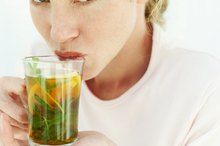The Effects of Alcohol & Caffeine on Dehydration
Dehydration is the term used to describe an imbalance between fluid needs and fluid loss: when more fluid is lost than is required for normal body processes, dehydration may occur. Symptoms indicating dehydration include feeling thirsty, dizzy or weak. Some people may notice that their eyes or mouth feel unusually dry. While it may seem reasonable to replenish fluid loss with any sort of beverage, some beverages -- for example, those that contain caffeine or alcohol -- may actually cause, or worsen, dehydration.
Diuresis
A diuretic is a substance that results in the body producing an increased amount of urine. According to Dr. Robert Swift and Dr. Dena Davidson, alcohol’s diuretic effect is fairly significant: drinking the equivalent of 50 grams of alcohol in about 8 ounces of water -- in other words, drinking four 2-oz. shots of liquor -- can result in the elimination of up to 1 quart of liquid as urine. This occurs because alcohol blocks the release of a hormone that is needed for water reabsorption. Without this hormone -- called antidiuretic hormone, or ADH -- the kidneys do not reabsorb the water; instead they excrete it as urine. Caffeine -- a stimulant that is found in coffee beans, tea leaves, sodas and even chocolate -- also has diuretic effects. The relationship between diuretic substances and dehydration is a straightforward one: any substance with diuretic effects, whether alcohol, caffeine or even a prescription medication, can result in dehydration 2.
- A diuretic is a substance that results in the body producing an increased amount of urine.
- The relationship between diuretic substances and dehydration is a straightforward one: any substance with diuretic effects, whether alcohol, caffeine or even a prescription medication, can result in dehydration 2.
Vomiting
Can Drinking Tea Dehydrate You?
Learn More
Many people have experienced the unpleasant consequences of drinking too much alcohol -- feeling nauseous, or even vomiting, afterwards. Repeated episodes of vomiting can also contribute to the dehydrating effect of alcohol: vomiting results in additional fluid loss, in addition to that resulting from the increased urinary output caused by alcohol consumption. Similarly, excess caffeine can result in people feeling nauseous and vomiting; MayoClinic.com suggests that a potentially harmful amount of caffeine is about 500 milligrams a day -- the amount found in 4 to 7 cups of coffee 23. Ironically, people who have consumed too much alcohol are often advised to “sober up” by drinking a cup of coffee: this combination may simply worsen an already existing state of dehydration. Anyone concerned that alcohol or caffeine intake has resulted in dehydration should try to increase intake of other beverages such as water or juice; if symptoms persist, or if you are unable to hold down fluid, seek medical attention.
- Many people have experienced the unpleasant consequences of drinking too much alcohol -- feeling nauseous, or even vomiting, afterwards.
- Repeated episodes of vomiting can also contribute to the dehydrating effect of alcohol: vomiting results in additional fluid loss, in addition to that resulting from the increased urinary output caused by alcohol consumption.
Urinary Frequency
Urinary frequency is described by the National Institutes of Health website, Medline Plus, as a feeling that one needs to empty the bladder more frequently than usual; the National Institute of Diabetes and Digestive and Kidney Diseases (NIDDK) further defines it as needing to urinate more than 8 times during the day 2. Caffeine can cause urinary frequency because it irritates the bladder, resulting in spasms of the bladder wall that are perceived by the person as an urge to urinate 2. Alcohol, via its effect of inhibiting water conservation, can also result in frequent urges to urinate. Urinary frequency can contribute to the other dehydrating effects of caffeine- and alcohol-containing drinks; a simple way to prevent the related, dehydrating side effects of caffeine or alcohol is to use them in moderation 2. While a cup of coffee daily, or a glass of wine with dinner, is not likely to result in dehydration, drinking excessively can lead to the unpleasant and potentially harmful symptoms of excess fluid loss.
Related Articles
References
- “Alcohol Health and Research World;” Alcohol Hangover; R. Swift and D. Davidson; 1998
- Medline Plus: Caffeine in the Diet
- MayoClinic.com: Caffeine: How Much is Too Much?
- NIDDK: Urinary Incontinence in Women
- MayoClinic.com: Bladder Control Problems in Women
- Zaragoza J, Tinsley G, Urbina S, et al. Effects of acute caffeine, theanine and tyrosine supplementation on mental and physical performance in athletes. J Int Soc Sports Nutr. 2019;16(1):56. doi:10.1186/s12970-019-0326-3
- Higashi Y. Coffee and endothelial function: A coffee paradox? Nutrients. 2019;11(9). doi: 10.3390/nu11092104
- Temple JL, Bernard C, Lipshultz SE, Czachor JD, Westphal JA, Mestre MA. The safety of ingested caffeine: A comprehensive review. Front Psychiatry. 2017;8:80. doi:10.3389/fpsyt.2017.00080
- National Institute on Drug Abuse for Teens. Is caffeine really addictive? Updated 2020.
- The American College of Obstetrics and Gynecology. Moderate caffeine consumption during pregnancy. Updated 2016.
- Kids Health from Nemours. Caffeine. Updated 2017.
- Beydoun MA et. al. Caffeine and alcohol intakes and overall nutrient adequacy are associated with longitudinal cognitive performance among U.S. adults. The Journal of Nutrition. 2014;144(6);890-901. doi:10.3945/jn.113.189027
Writer Bio
Shira Goldenholz has been writing since 2001. She has edited a neurosciences coursebook and co-authored an article published in the "Journal of Child Neurology." She has contributed to a report on children's mental health and has written for an autism website. She holds a medical degree from the University of Wisconsin-Madison and a Master in Public Health from Boston University.









